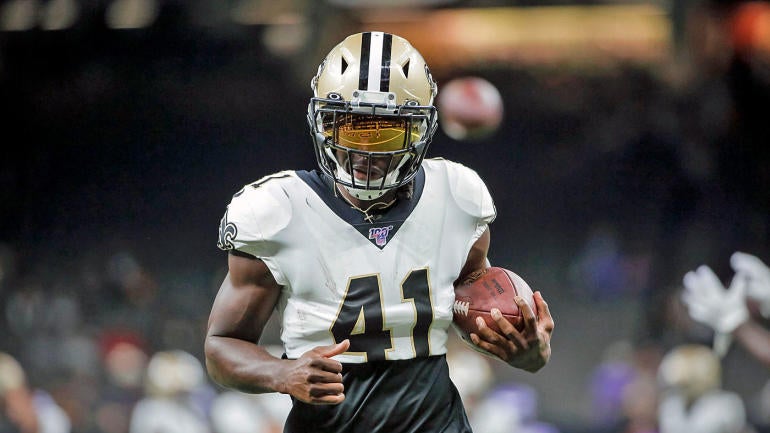
The New Orleans Saints were missing one of their top offensive weapons this week thanks to a reportedly unexcused training camp absence by star running back Alvin Kamara. While NFL Network has indicated Kamara is tending to an injury, others have reported the veteran's lack of participation in consecutive practices is contract-related. The three-time Pro Bowler is entering the final year of his rookie contract and figures to be near the top of New Orleans' list when it comes to future lucrative extensions.
What, exactly, could -- or should -- Kamara demand from the Saints on a new deal? Does the running back actually have any leverage in a holdout? Is New Orleans even capable of paying Kamara ahead of an uncertain 2021 salary cap?
Let's dive in and get you some answers.
Does Kamara have leverage in a holdout?
Not really, at least in terms of demanding a deal ahead of the 2020 season. Barring a highly improbable public feud, in which Kamara follows in the footsteps of guys like Jamal Adams and Yannick Ngakoue to demand a trade, the Saints can stand pat, pay the RB his $2.37 million this year, and then figure things out before 2021 free agency.
Why? Because if Kamara holds out for an extended period of time, including parts of the 2020 season, the new CBA dictates he'll be forced to surrender an accrued season toward free agency. In essence, he'd then become a restricted free agent (and remain under the Saints' control) in 2021. It's the same predicament Minnesota Vikings RB Dalvin Cook found himself in this offseason; both Cook and the Vikings want to strike a long-term deal, but they both know time is on the team's side.
Can the Saints even afford Kamara on a big deal?
Yes. With the NFL set to endure big financial losses and, thus, a reduced 2021 salary cap amid the COVID-19 pandemic, teams will be tighter on space following 2020. That's especially true of the Saints, who are projected to be among the teams most affected by a cap cut-down. But the reality is they can make an extension work if they want to.
It may take some cap-saving cuts in 2021, but there are candidates for that: WR Emmanuel Sanders ($6M savings), C Nick Easton ($6M), DT Malcom Brown ($5M). And the Saints have a history of back-loading big deals. If the Kansas City Chiefs, supposedly up against the cap this year, can give Patrick Mahomes a 10-year, $503M extension and Chris Jones a four-year, $80M deal of his own, then the Saints can find a way to lock up Kamara for the long term.
What will Kamara command on a new deal?
Only he and his representation can decide where to plant their flag in negotiations, but there's a reasonable argument Kamara should command at least $15 million per season on an extension.
First, let's outline the inevitable objections:
- But no one wants to pay running backs that much!
- But Kamara isn't even a "full-time" running back!
- But Latavius Murray proved he's replaceable!
- But he's injury-prone!
And now let's tackle each of them:
- Tell that to Tennessee -- they gave Derrick Henry, a traditional bruiser with much more wear and tear on the ground, a four-year, $50 million deal this offseason; or Carolina, which reset the entire market by giving Christian McCaffrey $16M per year.
- Kamara may be on a pitch count, limited to 60-70 percent of the Saints' offensive snaps, but that means he's a.) getting less wear and tear at a position known to break down at a faster rate; and b.) more efficient and productive than almost every other RB.
- You mean the Murray who'll be 31 in January and has totaled more than 40 catches just once in his six-year career? Yes, the reserve played admirably in 2019, but there's a reason he's been relegated to No. 2 duties by three different teams.
- Kamara has missed three games in three years. Cook, who's set to get well over $10M per year on his next deal, has missed 19 games in that same time frame. That label might be a tad overblown.
The true icing on the cake is the numbers, which show far and away that Kamara -- on "limited" touches or not -- is easily one of the top play-makers at his position, if not the entire spectrum of offensive positions. Everyone knows Kamara is an All-Pro talent, but the raw production shows he's due close to McCaffrey money.
Here's a look at the total output of Kamara, plus all the RBs with salaries above $10M per year, since 2017:
| Player | Total Yards | Total TDs | Yards Per Touch | Games | Avg. Annual Salary |
|---|---|---|---|---|---|
Christian McCaffrey | 5,443 | 39 | 5.9 | 48 | $16M |
5,030 | 32 | 5.0 | 41 | $15M | |
Alvin Kamara | 4,476 | 37 | 6.1 | 45 | $964K |
| Joe Mixon | 3,801 | 21 | 4.7 | 44 | $12M |
Derrick Henry | 3,784 | 36 | 5.1 | 47 | $12.5M |
3,196 | 15 | 4.5 | 30 | $13.1M | |
2,191 | 16 | 4.8 | 30 | $13M |
Even as a "pitch-count" RB, how in the world could you not compensate, let alone pass up on, that impact? In far fewer snaps, Kamara is gaining nearly as much, if not more, on the ground; scoring nearly as much, if not more, as both a runner and receiver; and eclipsing all of them in total yards per touch.
The Saints may not like the idea of rewarding a "running back" with $15 million per season, or the equivalent of what a more traditional workhorse like Elliott got in Dallas, but they cannot approach Kamara negotiations that way. Much like the San Francisco 49ers were forced to reconcile with the notion that George Kittle ($15M per year) is as much a wide receiver as he is a tight end, New Orleans has no choice but to see Kamara's multi-faceted role -- and three straight years of more than 80 receptions -- as central to contract talks.
It may not happen ahead of the 2020 season, and it may not happen until after a 2021 franchise tag, or something of the sort. But if the Saints want to keep Kamara around rather than auction him and his contract desires a la Brandin Cooks in 2017, it'd be a surprise if the final result didn't look something like a four-year, $60 million agreement.






















